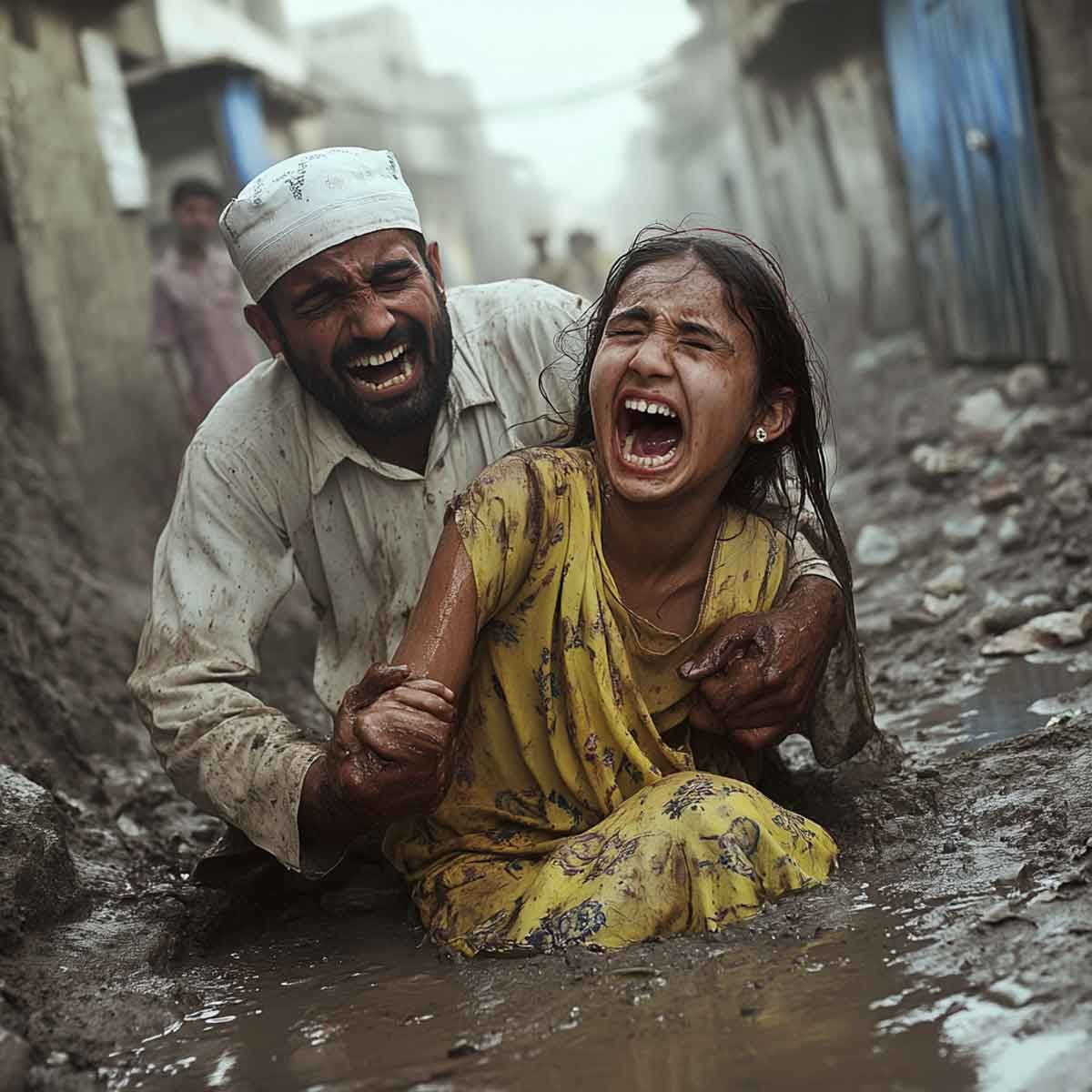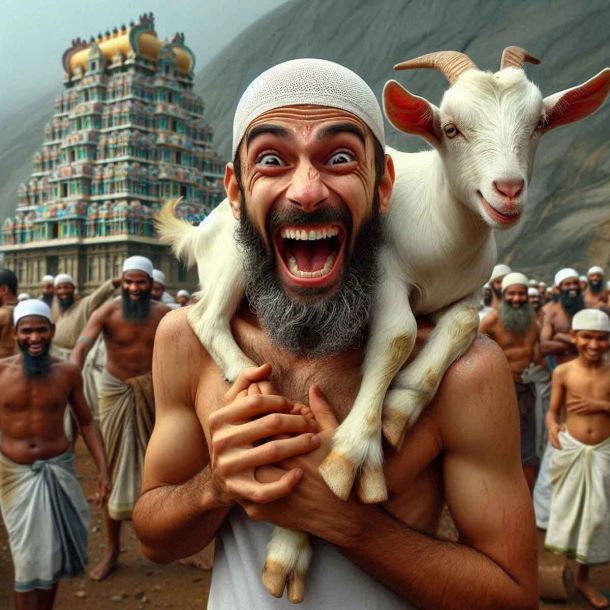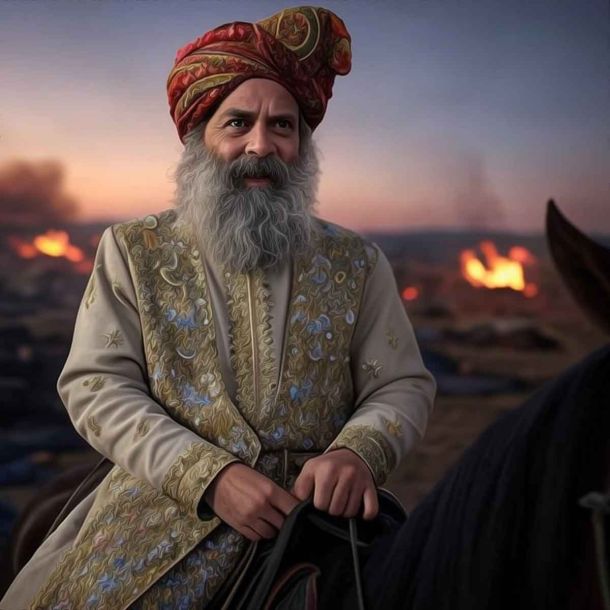MORE COVERAGE
Twitter Coverage
Satyaagrah
Written on
Satyaagrah
Written on
Satyaagrah
Written on
Satyaagrah
Written on
Satyaagrah
Written on
JOIN SATYAAGRAH SOCIAL MEDIA
Pakistan’s Hindus face a brutal reality as the HRCP report reveals rising mob attacks, forced conversions of girls, temple demolitions in Karachi, biased courts jailing innocents, and a state ignoring extremists like TLP, driving some to flee to India

On February 26, 2025, a significant and troubling report came to light from Pakistan’s Human Rights Commission of Pakistan (HRCP), shedding a harsh spotlight on the worsening conditions faced by the country’s minority communities. Titled "Under Siege: Freedom of Religion or Belief in 2023/24", this document paints a grim picture of the rising tide of violence, forced conversions, and deeply rooted discrimination targeting Pakistan’s Hindu population, especially in Sindh province. For many, this isn’t just a collection of statistics or distant events—it’s a heartbreaking reality that families and individuals are forced to endure every day, with little hope of change.
|
The report doesn’t hold back in detailing the kinds of violence Hindus in Pakistan are facing. It talks about terrifying mob attacks that leave communities shaken, the desecration of temples that strips away sacred spaces, and the targeted kidnappings of Hindu girls, who are then coerced into converting to another religion. These acts aren’t random; they’re part of a larger, troubling pattern. The HRCP points out how Pakistan’s judicial system, combined with extremist groups and the government’s failure to step in, has left Hindus in an incredibly vulnerable spot. Imagine living in a place where seeking justice feels like chasing a mirage—always visible, but never within reach. That’s the daily struggle for many Hindus in Sindh and beyond, as the report makes painfully clear.
The broader issue of religious freedom—or the lack of it—is another key focus. According to the HRCP, "Freedom of religion or belief (FORB) remains under constant threat in Pakistan, with religiously motivated violence and discrimination increasing yearly". For minorities like Hindus, this isn’t just a statistic; it’s a lived experience of fear and exclusion. The report, which covers violations from July 2023 to June 2024, shows how religious intolerance has woven itself into the fabric of society. Extremist views from the majority religion are twisted into weapons, used to attack individuals, shatter lives, and silence entire communities. What’s worse, the state seems either unwilling or unable to stop it. The report accuses authorities of lacking the guts to act, often turning a blind eye or even exploiting religious tensions for political gain. It’s a betrayal of "Article 20 of the Constitution, which guarantees citizens’ right to profess, practice and propagate their religion", a promise that now feels hollow to many. Instead, this period saw mob attacks on places of worship, graves defiled, people lynched, and sectarian clashes tearing communities apart. Hindu and Christian girls were forced into conversions, while others were displaced after being accused of blasphemy—often based on lies spread through social media. In one chilling example, far-right groups stirred up a mob to attack Christian homes and churches in Jaranwala, Punjab, showing just how easily hate can spread unchecked.
Blasphemy cases are another growing nightmare highlighted in the report. The numbers are climbing, driven by accusations over things people supposedly said or posted online—texts, social media updates, or messages on apps like WhatsApp. The HRCP notes that "the number of blasphemy cases has continued to spike due to complaints filed against allegedly blasphemous expression on social media, messenger apps and text messages". Even though Punjab’s Special Branch has looked into these cases, nothing meaningful has been done to stop the networks that trap innocent people in these false charges. It’s a system where justice feels like a distant dream. Sure, some accused of blasphemy get bail, but going back to a normal life? That’s nearly impossible, even if they’re cleared. And when it comes to mob violence—like lynchings or attacks—the police investigations are sloppy, and prosecutions are weak, letting the culprits walk free time and again. It’s a cycle of impunity that leaves minorities, especially Hindus, feeling abandoned by the very systems meant to protect them.
|
Hindus of Sindh – A Troubled Community
The Hindu community in Pakistan is small, making up just "2% of the country’s population", and most of them call rural Sindh their home. Life for these families isn’t easy—it’s a constant battle against fear, uncertainty, and threats from extremist groups. Many of these Hindus belong to what’s known as Scheduled Castes, a group that’s already pushed to the edges of society. They often find themselves stuck working as bonded laborers, toiling away in tough, shadowy conditions that leave them little room to breathe, let alone thrive. This mix of poverty and social isolation makes them sitting ducks for those looking to exploit or harm them. Picture a family scraping by, unsure if tomorrow will bring harassment or worse—that’s the reality for too many Hindus in Sindh today.
Beyond the economic struggles, there’s a daily grind of discrimination wearing them down. Hindu families speak of being harassed in public, shut out from basic facilities like water wells or markets, and facing intimidation that’s become almost routine. "Hindus in Sindh are also being subjected to increasing discrimination, intimidation, and day-to-day humiliation", the HRCP report confirms. One story that stands out is both shocking and heartbreaking: a Hindu bride was attacked on her wedding day by the son of a tribal chief in Sindh. The terror didn’t stop there—her family was so scared they packed up and fled to India within months. These kinds of incidents don’t always make the headlines or stir the police into action, leaving families to suffer in silence. It’s as if their pain doesn’t count, lost in a system that seems to look the other way when it comes to protecting them.
|
|
The Forced Conversion Crisis
One of the most gut-wrenching issues facing Hindus in Pakistan is the forced conversion of their girls, a crisis that’s tearing families apart. The HRCP report zeroes in on places like Ghotki, Umerkot, and Tharparkar, calling them "Hindu abduction hubs". In these districts, young girls—most of them underage—are snatched from their homes, pressured into converting to Islam, and married off to Muslim men under the flimsy excuse of “voluntary conversions.” It’s a nightmare no parent should face, yet it’s happening over and over. The report lays bare how these abductions aren’t isolated tragedies but part of a grim, organized pattern that’s stripping away the futures of these girls and leaving their families helpless.
What makes this even harder to stomach is the role of the courts and police. Instead of stepping in to protect these girls, they often side with the extremists. "Even the courts and police join extremists in their backing", refusing to let the girls return home even when they’re crying out to be reunited with their families. A key figure in this mess is Mian Abdul Haq, known as Mian Mithu, a cleric whose seminary, Dargah Bharchundi Sharif in Ghotki, has become a hub for these forced conversions. Girls are dragged there, coerced into marriages with Muslim men, and made to sign papers claiming it was all their choice—papers they’re forced to put their names on under duress. It’s a twisted process that robs them of their freedom and their faith, all while the authorities do little to stop it.
The case of Reena and Raveena, two Hindu sisters kidnapped in Sindh, hit the international news and shows just how broken the system is. Their parents pleaded with the court to bring their daughters home, but the judge turned a blind eye to their cries and legalized the forced marriages instead. This flew in the face of the Sindh Child Marriage Restraint Act, which sets "18 as the minimum age for marriage", but the law didn’t matter to that judge. The fallout? Many Hindu families are so terrified of losing their daughters that they’ve stopped sending them to school altogether, choosing safety over education. It’s a desperate move, but one they feel forced into by a reality where abductions are a constant threat.
The crisis doesn’t stop with individual cases—it’s reshaping entire communities. An earlier HRCP mission had warned about "the growing trend of underage marriages… to stave off the likelihood of forced conversions", a trend that’s still alive and well in 2023/24. Seminaries pushing these conversions keep running without consequence, while the fear of losing their daughters has driven some families to pull girls out of school and send them to local vocational centers instead. It’s a choice between education and survival, and too many are picking survival. Beyond Hindus, Christian girls like Laiba Suhail, abducted in Faisalabad in 2024 with conversion in mind, show this isn’t just one community’s burden. Even when courts step in—like in Pattoki, where a Christian woman was freed from a forced marriage—justice remains elusive for most. In April 2024, UN experts sounded the alarm, stating that "Christian and Hindu girls remain particularly vulnerable to forced religious conversion, abduction, trafficking, child, early and forced marriage, domestic servitude and sexual violence". It’s a stark reminder of how deep this problem runs, and how little has changed for those caught in its grip.
|
Vulnerability of Pakistani Sikhs
The Sikh community in Pakistan faced a brutal wake-up call in 2023 when targeted killings shook their sense of safety, leaving families wondering if they could even survive in their own country. "The targeted killings of Sikhs in 2023 left a question mark on the lives and survival of the community", pushing many to pack up and leave Khyber Pakhtunkhwa for other provinces—or, for some, to abandon Pakistan entirely. Imagine the heartbreak of fleeing your home, unsure if you’ll ever feel safe again. For Sikh women and girls, the fear doesn’t stop with violence—it extends to "forced conversions", a threat so real that families are pulling back on letting their daughters move freely or go to school. It’s a tough choice: keep them safe at home or risk losing them to coercion. The community’s future feels fragile, caught between preserving their way of life and protecting their loved ones.
Then there’s Nankana Sahib, a place sacred to Sikhs worldwide as the birthplace of Guru Nanak. You’d think it’d be a priority for development, especially with funds sitting in the Waqf Board’s hands. But "the development of Nankana Sahib, despite its importance for the Sikh faith globally and funds available to the Waqf Board, leaves much to be desired". Locals say the money isn’t reaching them—it’s allegedly being diverted elsewhere, leaving the area stagnant. Global Sikh organizations have raised their voices, too, worried about "the allocation of gurdwara land for undisclosed projects". They’ve urged Pakistan’s central Sikh body to fight back against what looks like a sneaky government plan to repurpose holy land. For a community already on edge, it’s another blow to their trust and identity.
|
Mob Violence and Hindu Attacks
Hindus in Pakistan aren’t just dealing with quiet discrimination—they’re facing outright attacks from angry mobs. The HRCP report lays it out plainly: "Hindu temples, shops, and homes have been repeatedly attacked by extremist mobs". Take what happened in 2023 in Karachi’s Soldier Bazaar—a Hindu temple wasn’t just vandalized; it was bulldozed by local authorities on a made-up excuse, all to clear space for some commercial project. It’s hard to fathom the pain of watching a sacred place reduced to rubble for profit. Down in Kashmore district, things got even scarier when extremists fired a rocket at a Hindu temple, sending a clear message of intimidation. During riots sparked by fake blasphemy claims, Hindu homes were looted, their belongings stolen while chaos reigned. What’s worse, "the police do not act or are not willing to act against extremists", leaving families defenseless against these violent outbursts.
False blasphemy accusations hit Hindus especially hard, often with life-shattering results. Take Nautan Lal, a Hindu school head teacher, as an example. Back in 2019, a student wrongly accused him of blasphemy, and by 2022, he was sentenced to life in prison. After years of fighting in court, he was finally acquitted in March 2024—but freedom doesn’t mean safety. "Nautan Lal will be living in fear for the rest of his life, always looking over his shoulders". Even when the courts say you’re innocent, the stigma and danger stick around like a shadow. The HRCP puts it bluntly: "a Hindu in Pakistan is enough to invite a deadly accusation of blasphemy". It’s a terrifying reality where just being who you are can turn into a death sentence overnight.
|
Anti-Hindu Discrimination
Discrimination against Hindus isn’t always loud—it can be a slow, steady erosion of their rights. In July 2023, a temple loved by the Madrasi Hindu community in Karachi’s Soldier Bazaar was torn down. "In July 2023, a temple frequented by the Madrasi Hindu community was razed in Karachi’s Soldier Bazaar", reportedly to make way for a commercial building. The community pushed back hard, and eventually, the Sindh government backed off, promising not to build on the site. But the damage was done—another piece of their heritage gone. Over in Narowal, Hindus don’t even have a working temple to call their own, making it tough to carry out their religious ceremonies. They say the Evacuee Trust Property Board has been renting out temple properties to outsiders, stripping them of what’s rightfully theirs.
In Sanghar, the struggle hits even closer to home. "The Hindu community’s land for burial was encroached on", forcing Scheduled Caste Hindus—who bury their dead instead of cremating them—to travel far just to lay their loved ones to rest. It’s a quiet indignity, but it stings all the same. And in Kashmore, violence flared up again in July 2023 when "dacoits launched a rocket at a Hindu worship site". After a string of robberies targeting Hindus in Sindh, the caretaker government at the time promised constitutional protections. But those words haven’t turned into action—the threats and attacks keep coming.
|
A Hindu Legal System Biased Against Hindus
The HRCP has put a spotlight on a justice system in Pakistan that’s letting Hindus down in the worst way possible. It’s a system that’s supposed to protect everyone, but for Hindus, it’s more like a locked door they can’t get through. Families who’ve faced terrible crimes—like losing a daughter to abduction or seeing their homes attacked—often walk into police stations with nothing but hope, only to leave with nothing at all. "Police authorities used to deny accepting FIRs in Hindu crimes", meaning their cries for help didn’t even get written down. It’s crushing to think about—a father or mother standing there, begging for someone to listen, and being told their pain doesn’t matter enough to matter.
Even when they push past that first hurdle and get a case started, the courts don’t make it any easier. The HRCP says the judiciary bends under pressure from religious groups, siding with the people who’ve caused the harm instead of those hurting. Cases about abductions or forced conversions just sit there, piling up dust while families wait for answers that never come. And for the few who make it to trial, it’s an uphill climb against scared-off witnesses, biased judges, and loud extremist crowds outside the courthouse. It’s a setup where justice feels like a far-off dream—imagine a family fighting for years, only to watch the system protect the wrong people. For Hindus, it’s not just about losing a case; it’s about losing faith that anyone in power cares.
|
Extremism and State Collusion
Extremism in Pakistan isn’t some hidden problem—it’s right out in the open, running the show in ways that make life terrifying for Hindus. The HRCP report paints a clear picture of how groups like Tehreek-e-Labbaik Pakistan (TLP) are fanning the flames, openly calling for violence against minorities without a shred of fear. They’ve got a system down pat: using mosque loudspeakers and social media to whip up mobs in just hours, turning quiet streets into danger zones for Hindu families. It’s the kind of thing that keeps parents awake at night, wondering if their home or temple will be next.
But what really stings is that the government doesn’t do anything to stop it. Even with hard proof—like videos or witnesses showing girls being taken and forced to convert—the state hasn’t made any real moves to call it a crime. There was a Supreme Court ruling back in 2014 meant to stand up for minority rights, but it’s been ignored, left to rot while the attacks keep coming. The police, security forces, and politicians act like they don’t see the violence—like it’s someone else’s problem while Hindu lives fall apart. It’s not just a failure; it feels like the state’s in on it, letting extremists run wild without a care.
The HRCP is practically shouting for something to change. They’re telling Pakistan to hit back at these extremist groups right now, to make tougher laws against child marriages, and to set up an independent team to watch over minority rights. Without that, they say, Hindus might not make it through this mess. The report shows a community under relentless attack—targeted killings cutting lives short, forced conversions tearing families apart, mob lynchings spreading fear, and a system that’s stacked against them. Some Hindus have already fled to India, crossing the border because Pakistan doesn’t feel safe anymore. It’s a desperate move, leaving behind everything they’ve known just to breathe easier.
The way things are going, with extremists getting stronger and blasphemy laws being twisted into weapons, Hindus are left wide open to a system that’s turning more hostile every day. It’s a slow squeeze—violence on one side, unfair rules on the other, and no one stepping in to help. The HRCP warns that unless big changes come soon, Pakistan’s Hindu minority might fade away completely. For those still holding on, every day is a quiet struggle—hoping for better, watching their kids closely, and wondering if their country will ever feel like home again.
 Support Us
Support Us
Satyagraha was born from the heart of our land, with an undying aim to unveil the true essence of Bharat. It seeks to illuminate the hidden tales of our valiant freedom fighters and the rich chronicles that haven't yet sung their complete melody in the mainstream.
While platforms like NDTV and 'The Wire' effortlessly garner funds under the banner of safeguarding democracy, we at Satyagraha walk a different path. Our strength and resonance come from you. In this journey to weave a stronger Bharat, every little contribution amplifies our voice. Let's come together, contribute as you can, and champion the true spirit of our nation.
 |  |  |
| ICICI Bank of Satyaagrah | Razorpay Bank of Satyaagrah | PayPal Bank of Satyaagrah - For International Payments |
If all above doesn't work, then try the LINK below:
Please share the article on other platforms
DISCLAIMER: The author is solely responsible for the views expressed in this article. The author carries the responsibility for citing and/or licensing of images utilized within the text. The website also frequently uses non-commercial images for representational purposes only in line with the article. We are not responsible for the authenticity of such images. If some images have a copyright issue, we request the person/entity to contact us at This email address is being protected from spambots. You need JavaScript enabled to view it. and we will take the necessary actions to resolve the issue.
Related Articles
- Moplah Genocide of the Malabar Hindus, 1921: Thousands of Hindus slaughtered
- "Traitors wear many masks but have only one face": J&K Bank's Chief manager, Sajad Ahmad Bazaz, sacked for shadowy ISI links, manipulating media with bank funds, and ties to extremist leaders, was planted for advancing the extremist-separatist ideology
- Prophecies of Jogendra Nath Mandal getting real after seventy years of his return from Pakistan
- Haunting history- 50 years of Operation Searchlight in Dhaka
- Aatish Taseer shows how his ‘jamaat’ has mastery over playing victim, brands Bollywood pro-Modi even as it remains anti-Hindu
- Dewan Bahadur saheb was made to quit as a Speaker because he wasn't a Muslim: Tragedy of a Christian leader who backed Pakistan’s creation
- Pakistani Media reporting abduction, forceful conversion as a consent marriage with the Muslim abductor in SIndh
- Supreme Court dismisses plea seeking protection of Hindus from the Muslim community in Mewat
- Murder case of Hindu Youth Kishan Bharwad took a far more sinister turn when a Pakistani political party link in the case is revealed: Hindus protest in Gujarat erupts
- Speech of Sardar Patel at Calcutta Maidan in 1948 busts the myth of ‘Muslims chose India’ and is relevant even today
- Muslim fundamentalists are not afraid of the Supreme Court of Pakistan and the government, demolished famous Hinglaj Mata Mandir in Pakistan: 11th attack in 22 months by religious fanatics
- Wikipedia dismisses Love Jihad as a conspiracy theory by Hindus, but claims reverse Love Jihad against Muslims is real
- Here is a list of 20 incidents where the ‘Jai Shri Ram’ slogan has been misused to turn a random crime into ‘hate crime’
- Violence Against Minority Hindus in Bangladesh: The Mistier World Of Silence
- Musical call for jihad: ‘melodious’ songs inciting for the genocide and beheading of Kafirs are terrifying



























